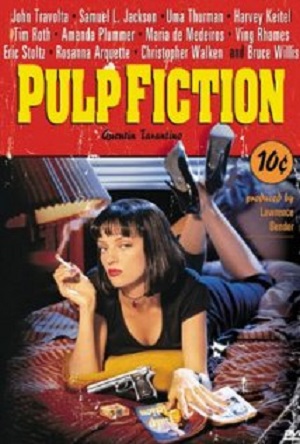
I love the movie “Pulp Fiction” (henceforth PF) because I love controlled chaos and excess; the exhilarating, intoxicating feeling of jumping into the abyss and somehow, miraculously, survived; the balm of true love; and the redemptive power of true religiosity. These are what I think the movie is about as it swims in a sea of language profanity, graphic violence, dark humor, and unchronological story telling.
Throughout the years, I have done a survey of sorts of friends and acquaintances about their opinions of PF. Those who don’t like the movie often cite language profanity, graphic violence, and nonlinear, hence confusing story telling. I then feel I have to expound to them why I love PF very much. I point out to them Tarantino, the screenplay co-writer high school dropout and the self-taught director of the movie, took a lot of risks in making the movie as it is . Yes, in the movie there appears chaos in the story telling, violence aplenty, excess of violence tinged with racist remarks and soothed by long dialogues laced with striking, jolting dark humor, but all of these are merely attention-grabbing vehicles for the director to dwell on the themes of love and religious redemption. Apparently love and religious redemption escaped the attention of my interlocutors since they invariably snort and laugh and demand proof and evidence and elucidation from me.
To me, deep love infuses throughout the movie. Butch risks his life to retrieve the heirloom watch, the symbol of love, that has been handled down in his family through several generations since Wold War I; the tender and touching love Butch and Fabienne have for each other; the interracial love, though unspoken, between Marsellus and Mia. While the violence in the movie was graphic, it was brief and not excessive. There were no close-ups or slow-motion shots in order to dwell on the violence. In fact, the movie seems to suggest that violence is inescapable and part of life, but it is not something to glorify about. That is why Butch admonishes the getaway female taxi driver Esmarelda Villalobos note the last name!) who lustfully talks about the death of the boxer at the hands of Butch. But the redemptive power of true religiosity is what affects me the most about the movie.
Religion has long fascinated me even though I fancy that I have been an atheist since the age of eleven, ever since I crudely yet boldly challenged God to strike me dead on the spot if He did indeed exist and was omniscient and omnipotent as people believed Him to be. Throughout the years I have come to believe that God is a fiction and a figment of human imagination and is made in Man’s image, and not the other way around. For some strong humans, the presence of God is not needed for them to live a moralistic life, but for most, however, His presence is badly needed. Even so, most of these people only pay lip service to their beliefs and as a consequence, their behavior falls short of the norm, and they live a life of “bad faith” (Sartre’s la mauvaise foi). They have no true ethical courage and no true faith. They mouth off and parrot religious exhortations but they cannot put them into practice. They drift in a sea of deception and self-deception. They long for and hunger after salvation, but they know in their heart of hearts, it will not come. But for Jules, a Bible-quoting gangster hit man, God, ironically, is real. So when he believed that he was saved from certain death from divine intervention, he quit the gangster business and presumably will live and die in peace. His cohort, Vincent, credited their miraculous of not being hit despite being shot at close range to chance, and not to divine intervention. And surely enough, later it is due to chance that Vincent meets his death when Butch returns to retrieve the heirloom gold watch in his apartment that Fabienne forgot to pick up. The movie seems to suggest that it does not really matter what one believes. What matters is the true fervor and sincerity of one’s beliefs and actions based on the beliefs. We are what we believe in.

John Hinckley was said to watch “Taxi Driver” more than ten times and ended up feeling infatuated with Jodie Foster and shooting at Ronald Reagan in the process of “impressing” her after his romanic overtures were spurned. I have watched PF at least six times and ended up thinking of it as a work of art and ruminating over it and shooting for the stars. I have studiously avoided reading what film critics have written about it because I want to avoid subliminal influences. I want my words about PF are all my own in a stream of consciousness about why the movie turned me on. It is one of the very few movies that did so. The first one was about the doomed love of a rickshaw driver.
“Rickshaw Man”, a Japanese movie that has stayed in my mind long after I viewed it only one time when I was on the cusp of adolescence (I have been on the lookout for it since I came to America). Even way back then, my painful impressions about Romantic Love were shaped. The movie tells the story of a rickshaw driver who becomes a surrogate father to the child of a recently widowed woman (her husband, an officer, died in the war). If my recollection does not fail me, he hopelessly falls in love with her, but maintains his dignity by not revealing it. He finally kills himself by purposely exposing himself to the elements one winter night in the park. The scenes of falling snow, the frozen body of a man who died because of love, and the crying of a woman—the object of the man’s love— have stayed with me. I should have never watched such a movie at an impressionable age. It was not healthy for me.
I myself once almost died over a woman when I was almost 23 years of age. What a fool I was! But without her, I would not want to write poetry, to learn French and other languages, and to try surpassing myself. Poetry attracts humans of sensitivity and propensity for suffering. They turn to poetry as a therapy. I think the process of writing poetry helps them deal with whatever is tormenting them. That’s why their confessional type of poetry is accessible to the public. Even so, for some, poetry couldn’t help them. They killed themselves anyway. Ann Sexton, Sylvia Plath, and John Berryman killed themselves decisively. Dylan Thomas and Charles Bukowski killed themselves slowly with booze. They are the famous cases. Many lesser poets killed themselves without being known by the public. Of all the artists, I would submit that the suicide rate of poets is the highest and of classical musicians the lowest. There must be something in the classical music that restores balance in the human soul.
I have a feeling that to truly enjoy a work of art, one must have a modicum of artistic feelings, otherwise one would miss much of its transformational powers. Most humans just have a “feel good” sentiment after seeing a movie or listening to a song or reading a poem. They then go on with their merry ways in life. These pieces of art don’t stay with them. Their reaction is not much different from that of having ingested a good meal when they are hungry and gulped down a glass of water or beer when they are thirsty.
I submit that one of the key differences (language and ethics have been other candidates), if not the only difference, between humans and non-humans is having a sense of aesthetics. Only humans universally find flowers beautiful and use them as objects of contemplation and decoration. Only artists would fully understand what and how other artists feel. Since artists are human beings endowed with an excess of intense feelings, some of them are not even of aesthetic nature, it is understandable but not necessarily acceptable that some of these intense feelings overflow and flood ethical self-control. Rimbaud, enfant terrible of French literature in the few years of the second half of the 19th century, was gay and almost wrecked Verlaine’s marriage. He later abandoned poetry altogether shortly before he turned 20 and hooked up with an Abyssinian woman when he became a gun runner. Picasso had many mistresses. Sartre slept with many women (even with his adopted daughter). Phạm Duy was a renowned and unscrupulous womanizer.

Regrettably these artists had a dissolute life, but they contributed something to the enrichment of human experiences, if not culture. We, as a human species, are culturally and aesthetically richer thanks to their legacies. We are glad they were born. Many of us wish we were like them, minus the foibles.

All organisms strive to pass on their genes. That is a biological imperative. Man is no different. The desire to have children is instinctive although it is overridden in some humans. Man is perhaps the only animal that violates and tramples on instincts more than other organisms. But Man is still driven to distinguish himself and to mark his passage on this planet. So humans have children and/or try to accomplish exceptional deeds. Artists may not consciously try to accomplish exceptional deeds. They probably just express what they feel and think and who they are. And if what they express have any artistic merits, they bring delight and pleasure and possibly wisdom to those having a discerning mind and artistic inclinations.
August 13, 2013
Roberto Wissai/NKBa’
















































